
Osibisa are a Ghanaian-British Afro-rock band founded in London in the late 1960s by four expatriate West African and three London based Caribbean musicians.

A Crazy Steal is the 18th UK studio album by English rock/pop group, the Hollies. It includes their version of Emmylou Harris' "Boulder to Birmingham", which had been released two years prior, reaching number 10 in the charts in New Zealand. Three other songs from this album were released in 1977, and 1978 as singles, yet failed to chart anywhere.
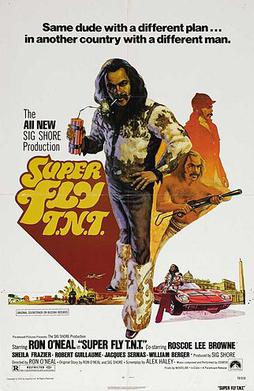
Super Fly T.N.T. is a 1973 American blaxploitation crime drama film directed and starring Ron O'Neal. O'Neal reprises his role of Youngblood Priest from the 1972 film Super Fly. The film was both a critical and commercial failure according to some critics.
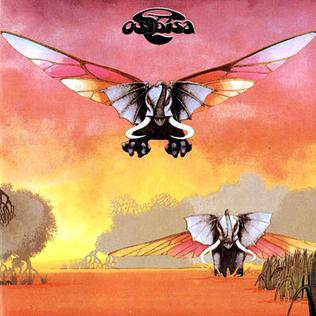
Osibisa is the self-titled debut album by British afro rock band Osibisa, released in 1971 by MCA. It was reissued in 2004 as a two-CD pack together with Woyaya by BGO Records.

Woyaya is the second album by Ghanaian Afro-rock band Osibisa released in 1971 by MCA. It was reissued in 2004 in a two-CD pack together with the self-titled album Osibisa by BGO Records.
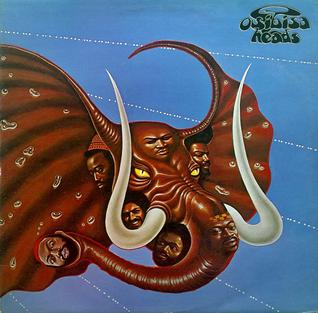
Heads is the third album by British Afro rock band Osibisa released in 1972.
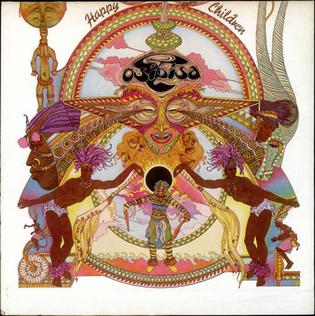
Happy Children is the fifth studio album by Ghanaian Afro rock band Osibisa released in 1973 by Warner Bros. Records WB 2732. Released on CD format 2000 by One Way Records 35164 and COE Records COE 111.
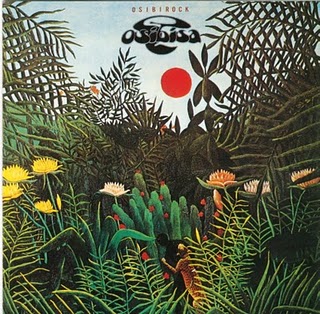
Osibirock is the sixth studio album by British Afro rock band Osibisa released in 1974 by Warner Bros. Records K56048 and WEA International WE 835. Issued in 2000 CD format by One Way Records 35165. The cover depicted Henri Rousseau's "Negro Attacked By a Jaguar".
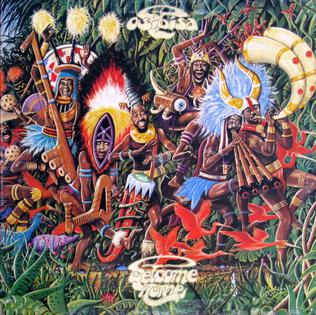
Welcome Home is the seventh studio album by British Afro rock band Osibisa released in 1975 by Island Records ILPS 9355. Issued in 1997 CD format by Red Steel Music Ltd. RMC 0208.

Ojah Awake is an album by Ghanaian Afro rock band Osibisa released in 1976 by Island Records ILPS 9411. Issued in 1995 CD format by AIM Records and then in 1997 remastered with bonus tracks on Red Steel Music (RMCCD9209)

Osee Yee is a studio album by Ghanaian Afro rock band Osibisa released in 2009 by Golden Stool Records – GSTOCD 002. It includes a rendition of George Harrison's song "My Sweet Lord" that's given an Osibisa funk spin. The back cover calls this an Osibisa Fourth Generation album.

Black Magic Night: Live at the Royal Festival Hall is a live double album by British Afro rock band Osibisa recorded at the Royal Festival Hall on 19 July 1977 with live versions of songs from their previous albums. Released in 1977 by Bronze Records and reissued as 2-CD set in 1993 on CD format by Castle Communications.

The Warrior is a compilation version of the album Ojah Awake (1976) by British Afro rock band Osibisa, released in 1992 by Soundwings Records MC-102.1075-2 and distributed by Serenade S.A., Barcelona, Spain. The CD duplicates the Ojah Awake album with the addition of a track dubbed from an Osibisa video.
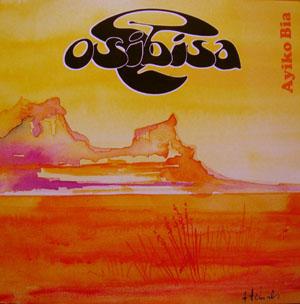
Ayiko Bia is a compilation album by British Afro rock band Osibisa released in 1992 by Soundwings Records (MC-102.1078-2) and distributed by Serenade S.A., Barcelona, Spain.

Africa We Go Go is a compilation album by British Afro rock band Osibisa released in 1992 by Soundwings Records (MC-102.1075-2) and distributed by Serenade S.A., Barcelona, Spain.

Jambo is a compilation album by British Afro rock band Osibisa released in 1992 by Soundwings Records (MC-102.1079-2) and distributed by Serenade S.A., Barcelona, Spain. This album is a re-release of 1989 vinyl album Movement issued by German label in-akustik, in-akustik under 89021 LP catalog number.
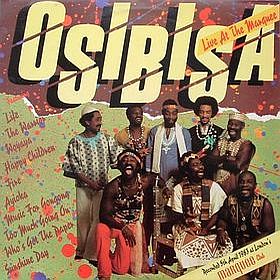
Live at the Marquee is an album by British Afro rock band Osibisa recorded live at The Marquee Club, London, April 5, 1983 and released in 1984 by Premier Records under catalog #1035. The concert has been issued as VHS in 1990 by Media 7 under the title Warrior and as DVD in 2003 by Umbrella Music under the title The Marquee 25th Anniversary presents Osibisa in Concert.

The Very Best of Osibisa is a 3-CD set unauthorised compilation bringing together three Osibisa's albums: Welcome Home, Ojah Awake and Africa We Go Go, released in 2001 by Prestige Records under catalog #205886-349. Do not confuse with other compilations released under the same name, such as "The Very Best of Osibisa" released in 2009 by Golden Stool label.
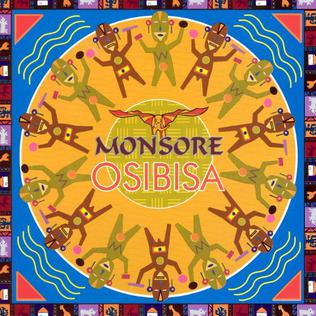
Monsore is an album by British Afro rock band Osibisa released in 1997 by Red Steel Music/Flying Elephant. A version was licensed to AIM for the Australian market. Their particular sound incorporated new world-fusion elements on this studio recording. The album was recorded in London in 1995 thru 1996.

Teddy Osei is a musician and saxophone player from Ghana. Osei is best known as the leader of the Afro-pop band Osibisa, founded in 1969. Born in Kumasi, Osei was introduced to musical instruments while still a child. He began to play the saxophone while attempting to create a band with his college friends in the coastal city of Sekondi. After graduating from college, he worked as a building inspector for a year before creating a band called "The Comets." The Comets enjoyed brief popularity before Osei traveled to London in 1962. He received a grant from the Ghanaian government to study at a private music and drama school for three years, before being forced to leave by a regime change in Ghana. In 1969, he founded Osibisa along with several other musicians. The band remained popular through the 1970s, before experiencing a decline, although it continues to perform today.




















